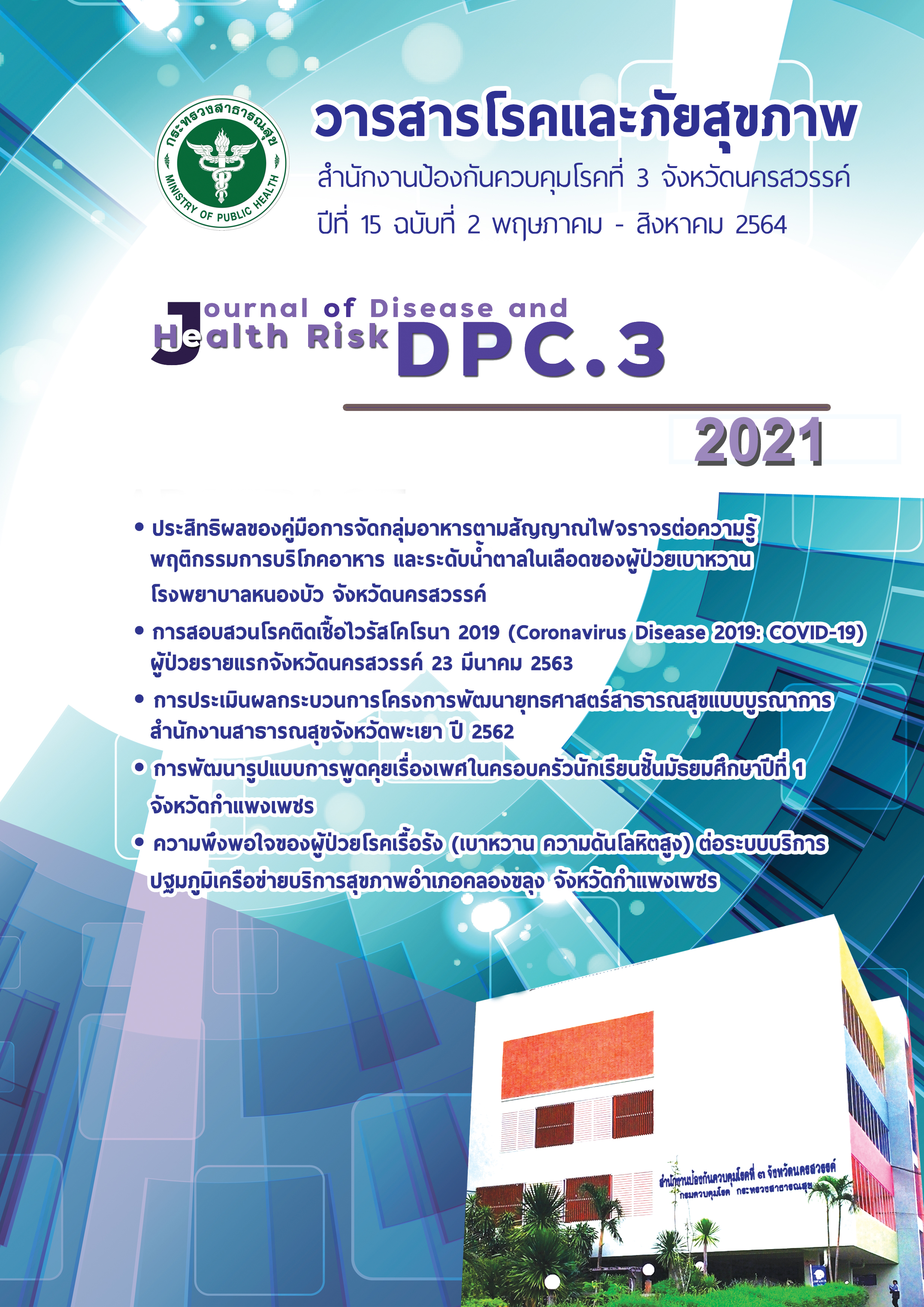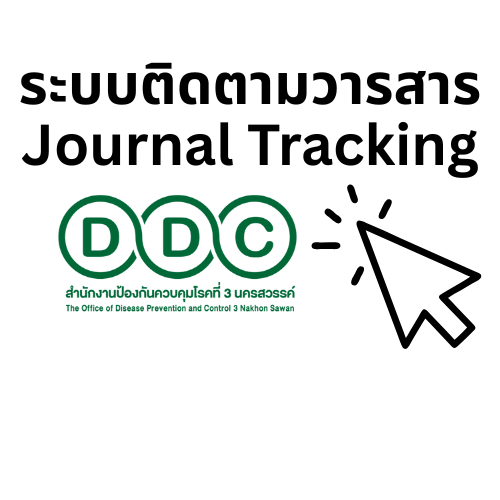The Development of Family Sex-Talk Model for Grade 7 students, Kamphaeng Phet Province
Keywords:
Sex Talk Model, Grade 7 students , Kamphaeng Phet ProvinceAbstract
The Development of Family Sex-Talk Model for Grade 7 students, Kamphaeng Phet province aimed to develop a model for Sex-Talk in the family of grade 7 students, and to evaluate the outcomes of this model. This action research was divided into 4 stages; consisting of 1) Study on the situation and problems in talking about sex in the family, 2) Develop a family sex-talk model for grade 7 students, 3) Implement this family sex-talk model to grade 7 students and their parents, and 4) Evaluate the outcomes of this family sex-talk model. Participants were 30 pairs of students and their parents, selected by a purposive sampling. The study tools composed of the learning activity plan, the questionnaire on Sexuality knowledge, attitude toward sex-talk, the comfort of sex-talk, the practice of sex-talk, family sex-talk and sexual risk behaviors monitoring, including in-dept interview. The data were analyzed by descriptive statistics; frequency and percentage. Content analysis was adopted to analyze qualitative data. The t-test statistics were utilized to analyze pre-post implementing data. Results revealed that students and their parents’ sexuality knowledge, attitude toward sex-talk, the comfort of sex-talk, and the practice of sex-talk were highly increased than the previous implementation significantly (p< 0.001). The family sex-talk monitoring data showed that students and their parents gained more sex-talk, whereas the sexual risk behaviors of students declined from “frequently” to “seldom” or “never.” Suggestions were to implement this family sex-talk model to all secondary schools in Kamphaeng Phet province, monitor the usage of this model in the long run, develop a follow-up plan for students and their parents from grade 7 to 8 and 9, and integrate this model into school system, in order to achieve the continuity and persistence of family sex-talk and reduce teen pregnancy.
References
สำนักพัฒนาระบบข้อมูลข่าวสาร.วัยรุ่นไทยมีเพศสัมพันธ์.[อินเทอร์เน็ต]. 2563 [เข้าถึงเมื่อ 10 ธ.ค. 2563] เข้าถึงได้จาก : https://www.hiso.or.th
สำนักงานกองทุนสนับสนุนการสร้างเสริมสุขภาพ. คุยเรื่องเพศกับลูก คว้าโอกาสทองเปิดใจ.[อินเทอร์เน็ต]. 2563 [เข้าถึงเมื่อ 10 ธ.ค. 2563] เข้าถึงได้จาก https://www.thaihealth.or.th
สำนักอนามัย การเจริญพันธุ์ กรมอนามัย.รายงานการเฝ้าระวังการตั้งครรภ์แม่วัยรุ่น อายุต่ำกว่า 20 ปี พ.ศ. 2559-2561.
กระทรวงสาธารณสุข.รายงานตามตัวชี้วัดในระดับกระทรวงสาธารณสุข ปี2561- 2563. [อินเทอร์เน็ต]. 2563 [เข้าถึงเมื่อ 10 ธ.ค. 2563] เข้าถึงได้จาก https://hdcservice.moph.go.th/hdc/reports/report_kpi.php?flag_kpi_level
การคุยเรื่องเพศกับลูกไม่ใช่เรื่องน่าอาย และเป็นสิ่งที่พ่อแม่ทุกคนต้องทำให้ได้อย่างถูกวิธี. [อินเตอร์เน็ต]. 2563 [เข้าถึงเมื่อ 15 ธันวาคม 2563]. เข้าถึงได้จาก: https://thestandard.co/podcast/balancedmama13/.
อรอุมา ทางดี นฎาประไพ สาระ และ ภัทรพงศ์ ชูเศษ.2561.การพัฒนาหลักสูตรการจัดการอบรมเรื่องเพศคุยได้ในครอบครัว.[อินเทอร์เน็ต]. 2563 [เข้าถึงเมื่อ 10 ธ.ค. 2563] เข้าถึงได้จาก https://he02.tcithaijo.org/index.php/RHPC9Journal
ชุติมา เทียนชัยทัศน์และคณะ. การศึกษาแบบจำลองเชิงสาเหตุพฤติกรรมการมีเพศสัมพันธ์ที่ปลอดภัยของวัยรุ่นหญิง. [อินเทอร์เน็ต]. 2563 [เข้าถึงเมื่อ 15 ธ.ค. 2563] เข้าถึงได้จาก https://he01.tci-thaijo.org/index.php/pnc/article/view/117545
อาภาพร เผ่าวัฒนา พิมพ์รัตน์ ธรรมรักษา.ประสิทธิผลของสื่อการเรียนรู้ในการพัฒนาการสื่อสารเรื่องเพศของมารดาที่มีบุตรวัยรุ่นหญิง.[อินเทอร์เน็ต]. 2563 [เข้าถึงเมื่อ 10 ธ.ค. 2563] เข้าถึงได้จาก https://nursing.iserl.org/bcn/index.php/researcher/Profile/rs_popup/6715
ประภาพร สุวรรณกูฏ และคณะ. การศึกษาผลของโปรแกรมส่งเสริมการสื่อสารเรื่องเพศต่อความสะดวกใจ และปฏิบัติการสื่อสารเรื่องเพศ ระหว่างวัยรุ่นหญิงตอนต้นกับมารดา. [อินเทอร์เน็ต].2560 [เข้าถึงเมื่อ 15 ธ.ค. 2563] เข้าถึงได้จาก https://he01.tci-thaijo.org/index.php/JNAE/article/view/122686
ปัญญ์กรินทร์ หอยรัตน์ และปราโมทย์ วงศ์สวัสดิ์. ศึกษาปัจจัยที่มีอิทธิพลต่อพฤติกรรมการมีเพศสัมพันธ์ของนักเรียนชั้นมัธยมศึกษา.[อินเทอร์เน็ต]. 2562 [เข้าถึงเมื่อ 15 ธ.ค. 2563] เข้าถึงได้จาก file:///C:/Users/user/Downloads/241962-Article%20Text-838556-2-10-20200527%20(1).pdf
นางสุมาลี กลิ่นแมน นางสาวพรชนก สีหะวงษ์ สำนักงานป้องกันควบคุมโรคที่ 3 จังหวัดนครสวรรค์. การบูรณาการภาคีเครือข่าย เพื่อป้องกันและแก้ไขปัญหาการตั้งครรภ์ในวัยรุ่น จังหวัดนครสวรรค์.[อินเทอร์เน็ต]. 2563 [เข้าถึงเมื่อ 10 ธ.ค. 2563] เข้าถึงได้จาก https://he01.tci-thaijo.org/index.php/JDPC3/article/view/241317
Downloads
Published
How to Cite
Issue
Section
License
Copyright (c) 2021 Journal of Disease and Health Risk DPC.3

This work is licensed under a Creative Commons Attribution-NonCommercial-NoDerivatives 4.0 International License.
Copyright notice
Article published in the Journal of Disease and Health Risk DPC.3 Nakhon Sawan. It is considered a work of academic research and analysis as well as the personal opinion of the author. It is not the opinion of the Office of Disease Prevention and Control 3, Nakhon Sawan. Or the editorial team in any way Authors are responsible for their articles.
Privacy Policy
Name, address and e-mail address specified in the Journal of Disease and Health Risk DPC.3 Nakhon Sawan. It is used for identification purposes of the journal. And will not be used for any other purpose. Or to another person.









